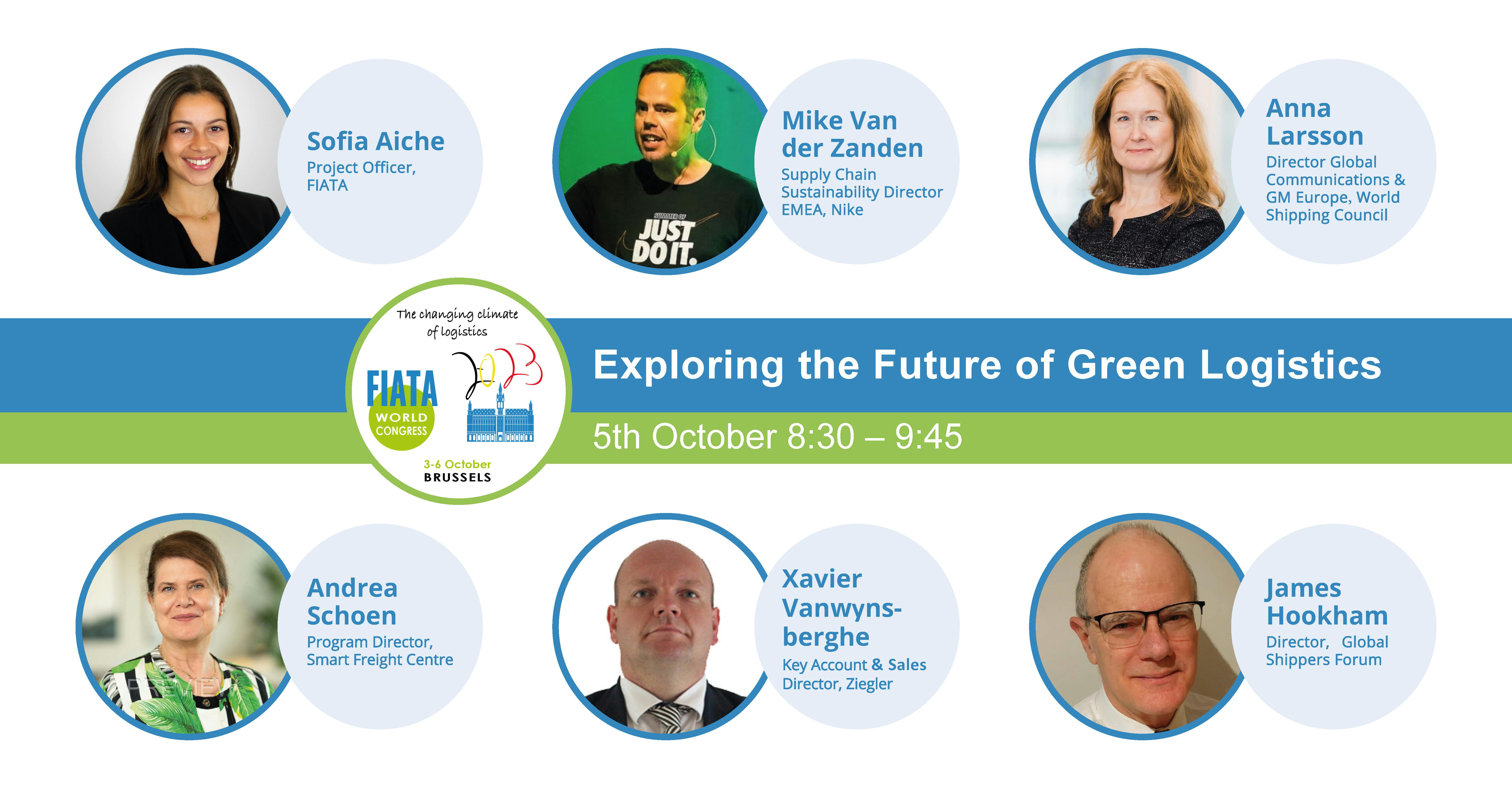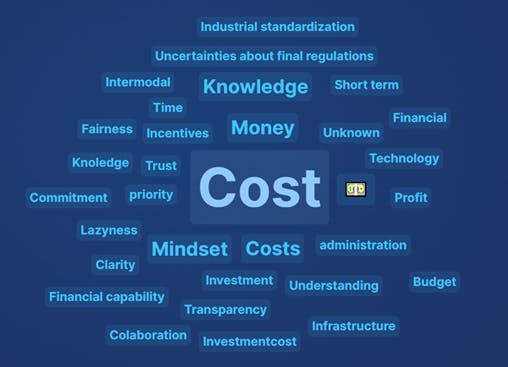Exploring the Future of Green Logistics
Panelists:
Mike Van der Zanden, Supply Chain Sustainability Director EMEA, Nike,
Anna Larsson, Director Global Communications and GM Europe, World Shipping Council,
Andrea Schoen, Program Director, Smart Freight Centre,
Xavier Vanwyns-berghe, Key Account and Sales Director, Ziegler, and
James Hookham, Director Global Shippers Forum
gathered on this sustainability panel at the 2023 FIATA World Congress to dissect the topic of green logistics, hurdles and opportunities going forward, with increasing global regulations coming into place in the next year.

“Global transport contributes one quarter of global CO2 emissions”
What factors are driving our industry to a future of green logistics?
Anna Larsson responded: “We have a climate crisis which we need to address”. She shared of the disparity between the northern and southern hemispheres, which are economically unequal, with the additional burden of a cost of living crisis around the world. “We need to make this transition as efficient as possible.” What is driving the pace of change? she asked. “In shipping, there have been lots of regulatory developments in recent years” with energy efficiency ratings already in place. The International Maritime Organization recently set a zero emissions target for 2050, plus stringent targets for 2030 and 2040. EU ETS (Emissions Trading System, EU carbon tax) will come into place as of January 2024.
Andrea Schoen, who worked on the new ISO 14083 standard in her role at Smart Freight Centre raised that “it is key that we compare apples with apples and pears with pears. The logistics industry is a global business, and in the supply chain we’re in, we shouldn’t create our own vision of how to account for changes we make, but make a standard that we can pass through the chain. That is the unique scope of the new ISO 14083”.
Now people want to make a credible and transparent change; only when it is credible, will the supply chain invest in it, which is what standards are good for”. She noted that the “very foundation is to have the right level of data at the right aggregation level throughout the supply chain”.
Global disparity in opportunities and resources
Ms Aiche, moderator and FIATA Sustainability Officer, raised the concern that regional complexities exist, and that through FIATA’s global work with stakeholders, this is very clear. Currently packages can be found in volume in Europe, such as the ‘Green Deal’, ‘Fit for 55’ package and more. She asked Mr Hookham to speak about the global disparity, and how forwarders in less economically developed regions can contribute to change, not only for the sake of the global climate crisis, but also to prepare themselves for incoming legislations which will inevitably be inflicted upon them as a result of the trickle-down effect.
James Hookham responded, sharing that smaller forwarders not in the west should also take this issue seriously, and that all must confront the climate crisis as an emergency in their businesses. He is talking to his members at the Global Shippers’ Forum advising associations to talk to their authorities. He shared that “we need to stop talking about timings and transition, but rather about resilience planning which is not something for the next generation, but for now”. He noted that this is what is starting this next year, and that there will continue to be a series of step changes, in the way that logistics services are priced, and how stakeholders at different supply chain levels should respond in response to regulation. This in turn will trigger a change in language, offer positioning, and pricing from shipping lines to forwarders. “It’s not a case of a luxury item, shipping will come with requirements, and as the traditionally valued intermediary, the freight forwarder will need to step up and come up to date quickly with this transition.”
Ms Schoen emphasised that SME’s (small and medium-sized enterprises) will suffer and struggle most to see this as a pressing priority in their agenda. When asked how forwarders can pick this up, she shared that the quickest steps that are cost effective at the same time must be prioritised. She encouraged forwarders to implement tools that are on the market which are not overly expensive, or use in-house solutions, developing knowledge rather than assets as a forwarder. There’s a political advocacy that something should be feasibly affordable and if you can’t recover your cost then her company do not encourage that.
Why is green investment good for business?
Mike Van der Zanden responded: “You want to make it end-to-end, it’s about making it part of your marketing plan. Supply chain efficiencies are not just good for the planet, but also for business sustainability, and companies can use these returns to invest into the supply chain."
Xavier Vanwyns-berghe shared that in early 2021, Ziegler launched their ‘Now Even Greener’ programme. This was a main pillar for them, not only driven by customer demand, but everything around their logistics operations, including investors. When they looked at their footprint, they made an investment plan into new buildings, for which they won an award recently. They looked at existing building plans and made a standard to make buildings ecologically neutral. Their HQ for example is now completely energy neutral.
When asked whether the forwarding company hire someone to do their sustainability management, or whether they use in-house solutions, Mr Vanwyns-berghe replied “Ziegler do things in-house, they hire people on board to make changes internally, with a panel of Board Members who are very experienced in the company, people with a background in sustainability, who challenge and come to solutions on all things green logistics. "
Poll
In the context of green logistics, what do you believe is the biggest challenge for supply chain optimisation?
Balancing sustainability with cost-efficiency
71%
Ensuring transparency in the supply chain
23%
Adopting renewable energy sources for logistics operations
12%
Managing waste and recycling within the supply chain
2%
James Hookham responded: "Make sure you don’t get ripped off, is what people are saying when they answer this poll. 2024 will be the year that the costs of decarbonsing shipping and aviation become the focus of Finance Directors and not just sustainability managers. Shippers and forwarders everywhere need to learn why and how these costs arise, whether they are reasonable, and start to ‘Record, Report and Reduce’ their carbon footprints in order to minimise them.”
He encouraged forwarders to make sure they are not overpaying for carbon reduction, and that they are not getting caught up in green washing, and only in genuine efforts, making sure to account for them and recording it so they can be picked up in others’ carbon accounts.
Andrea Schoen: “There’s also an internal tool available within companies to balance external and internal costs with an internal carbon pricing system. Companies are creating an internal budget based on the external carbon price. At the moment, carbon is at around 90EUR/t CO2e, and you can mirror this in your systems. Look at what you need to pay to cover these costs, and make a system in which you offset the money you spend.
Word Cloud
In one word, what is the most critical barrier to implementing green logistics in your company?

Responding to this result, panelists shared that getting systems in place, the appropriate talent, and a proper environmental strategy are key. Ms Larsson noted that “the cost of this new energy comes down to a choice of paying to delay (through carbon taxes), or investing in the future, and that with paying to delay, you’re just throwing money away.”
In closing, the floor was opened for audience questions, with one sharing that the costs associated with Sustainable Aviation Fuels are 45% higher than Jet A-1 fuel, and they are subject to such fuel availability. James Hookham responded, saying that contract prices must be taken advantage of, and that spot prices should be avoided.
Panelists were asked to share one brief word or phrase to summarise:
James: Record what you emit, report it, reduce it and repeat that cycle
Anna: Invest, don’t pay to delay the change, invest in the future, it’s cheaper in the long run
Xavier: Change
Andrea: Join first movers, whatever size you are
Mike: Mindset